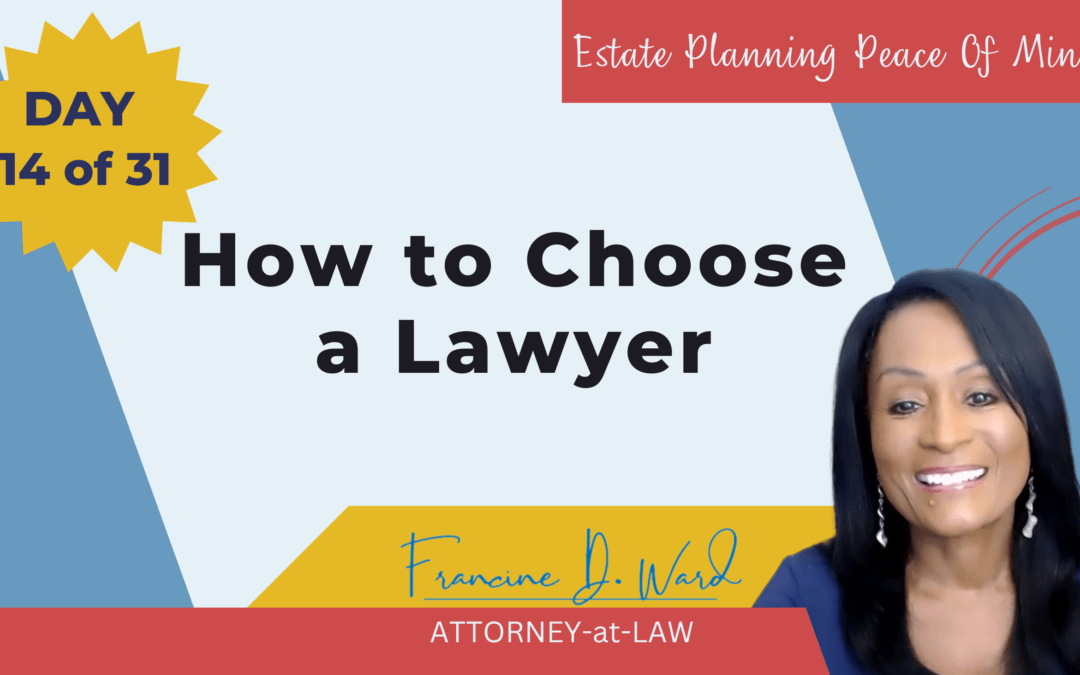How to Choose a Lawyer?
Choosing an estate planning lawyer to work with is a personal experience. It doesn’t matter whether you’ve hired them for a business issue, a family law matter, a personal injury concern, or an employment-related question; great care should be taken when choosing your advocate. With that in mind, creating an estate plan is highly personal and often emotional. Your estate planning attorney will know more about you than, in some cases, your best friend. Therefore, your attorney should be someone that, at a minimum, you trust.
Factors to Take Into Account When Choosing a Lawyer.
Below are some things to consider when choosing a lawyer:
- Make sure they are experienced in estate planning.
You might think this is a no-brainer, but surprisingly many people think all lawyers know everything about every area of law. For example, my website and profiles clearly say that my practice areas are estate planning and intellectual property (copyrights and trademarks). Yet, I am amazed at how often I get calls for personal injury, bankruptcy, employment, real estate, and my favorite—criminal law. Think of it like this: if you needed a gynecologist, would you hire a pulmonologist, podiatrist, or proctologist? It’s doubtful. - Why did they pick estate planning as their practice area?
While not a requirement, knowing why someone chooses estate planning as a practice area is always a good idea. It helps you get a sense of who they are. Because, at its core, estate planning is a personal endeavor. Some estate planning attorneys were influenced by personal experiences. Understanding their reasoning gives you a peek into how they practice law. Are they passionate, or is it just a job? Are they detailed focused, or do they just cut and paste or fill in the blanks? - What is their process?
How do they work with clients? What is their process? If you are new to estate planning, the process can be daunting, especially if you don’t know what to expect. For that reason, having a sense, even a general sense, of what to expect can help allay any fears you might have. And not all lawyers are created equal. They may vary by years of experience, age, competence level, state of practice, comfort level, fees, and so much more. Also, some lawyers like to meet in person; others work primarily by phone and in a virtual setting. Some have clients review their documents several times to ensure they understand what they are signing; other lawyers prepare one version and have the client sign. When it is a trust-based estate plan, some lawyers prefer to handle the trust’s funding themselves; others may handle just the primary residence and charge extra for additional assets. These are questions you should ask so there are no surprises. - What information does the lawyer need from you?
Knowing what the lawyer needs from you is essential. For your estate plan to be complete, you must provide accurate and reliable information to the attorney. Your plan is as helpful as the information it’s based on. If you are less than truthful with your attorney, you upset the entire process by failing to disclose relevant information. Such necessary information includes bank accounts, brokerage accounts, real estate, valuable tangible personal property, outstanding debts, and intellectual property. In addition, who will you choose to be your trustee, executor, agent for healthcare, your agent for finance, and their successors? These are just some important information your attorney will need to know.

Francine D. Ward
Attorney-At-Law, Author, Speaker
Follow Francine:
Don’t miss Francine’s Latest Blogs:
- Sweepstakes ScamsSweepstakes Scams. The Federal Trade Commission (FTC) has settled with several operators of a sweepstakes scam. The scam bilked consumers out of millions of dollars. Included in the settlement agreement,… Read more: Sweepstakes Scams
- Incapacity PlanningIncapacity Planning. Incapacity is an unexpected wrinkle in your estate plan. I am a planner. I make plans, I like making plans, and sometimes my plans go awry. Despite any… Read more: Incapacity Planning
- Publishing contractsPublishing contracts The publishing contract is an agreement that defines the relationship between an author and her publisher. Publishing contracts typically contain elements that speak to territory, rights, ownership, financial… Read more: Publishing contracts
- What is a Habit?As we enter springtime, you may feel far away from your New Year’s resolution. That may be because of the success rate of NYE resolutions. In fact, January 17 is… Read more: What is a Habit?
- Common Contract MistakeCommon Contract Mistake #1. Not Having Written Agreements with EVERYONE You Do Business With. Common contract mistake. Without question, the most common contract mistake is not having the terms of… Read more: Common Contract Mistake











